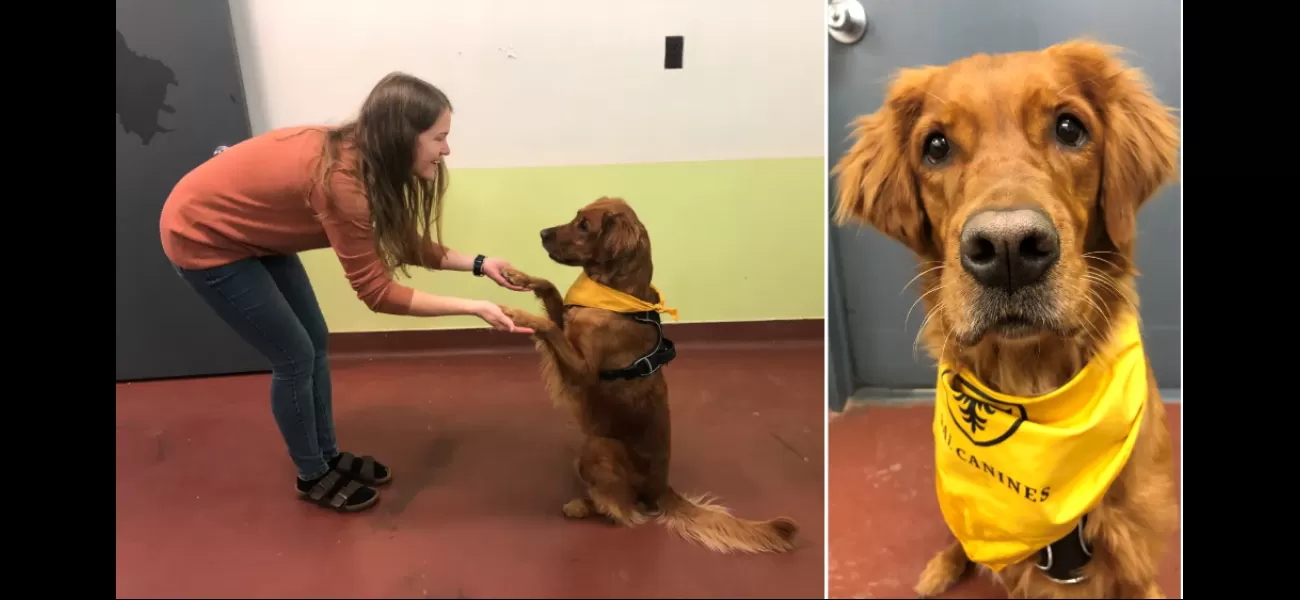Dogs trained to identify signs of PTSD through scent.
Are there limits to what dogs can achieve?
March 28th 2024.

Let me introduce you to Ivy, a very special dog with a unique talent. Ivy has been trained to detect stress in human beings, specifically those who are at risk of experiencing post-traumatic stress disorder (PTSD) flashbacks. Along with another dog named Callie, she has been able to recognize the scent of trauma reactions in a recent pilot study. This breakthrough is significant as it can make PTSD assistance dogs more effective in helping those who suffer from this mental health condition.
For those who may not know, PTSD is a mental health condition that is triggered by a terrifying event, such as a car accident or a terrorist attack. It can affect a person who has experienced the event themselves or even those who have witnessed it. Some of the symptoms of PTSD include flashbacks, nightmares, severe anxiety, and uncontrollable thoughts about the event. However, detecting PTSD can be a challenge. This is where Ivy and Callie come in.
Dogs are known for their sensitive noses and their ability to detect various medical situations, such as seizures. However, only Ivy and Callie out of the 25 dogs that were tested were able to complete the rigorous training process. Laura Kiiroja, the first author of the study, explains that while PTSD service dogs are already trained to assist people during episodes of distress, they are currently trained to respond to behavioral and physical cues. This study showed that dogs can also detect these episodes through the scent of a person's breath.
Now, let's take a closer look at PTSD. It is a mental health condition that can be caused by very stressful, frightening, or distressing events. Any situation that a person finds traumatic can lead to PTSD. This could include serious road accidents, violent personal assaults, major health problems, or even childbirth experiences. It can occur immediately after the event or even years later. It is estimated that one in every three people who have experienced a traumatic event may develop PTSD, but it is not yet fully understood why some people are more susceptible than others.
According to the National Health Service (NHS), assistance dogs can help patients by alerting and interrupting episodes when their companions are struggling with their symptoms. If dogs can detect stress markers on a person's breath, they can potentially intervene at an earlier stage, making their assistance even more effective. Every human has a unique scent profile, influenced by factors such as genetics, age, and activities. There is evidence that dogs can detect volatile organic compounds (VOCs) related to human stress, but no studies have been done on whether they can specifically detect those associated with PTSD symptoms.
To conduct their research, Laura Kiiroja and her team recruited 26 people who had experienced trauma to donate their scents. These participants were also part of a larger study on trauma reactions. They were asked to wear different facemasks while recalling their traumatic experiences. One of the facemasks provided a calm breath sample, while the other, worn during the recall of the traumatic experience, provided a target breath sample. The participants also completed a questionnaire about their stress levels and emotions.
The research team then recruited 25 pet dogs to train in scent detection, but only Ivy and Callie were able to complete the study. According to Ms. Kiiroja, both dogs found this work inherently motivating and were always eager to get started. They were trained to recognize the target odor from pieces of the facemasks and were able to achieve 90% accuracy in discriminating between stressed and non-stressed samples. In a second experiment, Ivy achieved 74% accuracy, while Callie achieved 81%.
Although this is a proof-of-concept study, the team plans to conduct further research with larger sample sizes to validate their findings. They also hope to collect samples from a higher number of stressful events to confirm the dogs' ability to reliably detect stress VOCs in the breath of different individuals across various contexts.
In conclusion, Ivy and Callie's ability to detect stress on a person's breath could greatly benefit those with PTSD. This study has shown that dogs can be trained to recognize the scent of trauma reactions, making them even more effective as assistance dogs. With further research, this breakthrough could potentially improve the lives of many individuals living with this challenging mental health condition.
For those who may not know, PTSD is a mental health condition that is triggered by a terrifying event, such as a car accident or a terrorist attack. It can affect a person who has experienced the event themselves or even those who have witnessed it. Some of the symptoms of PTSD include flashbacks, nightmares, severe anxiety, and uncontrollable thoughts about the event. However, detecting PTSD can be a challenge. This is where Ivy and Callie come in.
Dogs are known for their sensitive noses and their ability to detect various medical situations, such as seizures. However, only Ivy and Callie out of the 25 dogs that were tested were able to complete the rigorous training process. Laura Kiiroja, the first author of the study, explains that while PTSD service dogs are already trained to assist people during episodes of distress, they are currently trained to respond to behavioral and physical cues. This study showed that dogs can also detect these episodes through the scent of a person's breath.
Now, let's take a closer look at PTSD. It is a mental health condition that can be caused by very stressful, frightening, or distressing events. Any situation that a person finds traumatic can lead to PTSD. This could include serious road accidents, violent personal assaults, major health problems, or even childbirth experiences. It can occur immediately after the event or even years later. It is estimated that one in every three people who have experienced a traumatic event may develop PTSD, but it is not yet fully understood why some people are more susceptible than others.
According to the National Health Service (NHS), assistance dogs can help patients by alerting and interrupting episodes when their companions are struggling with their symptoms. If dogs can detect stress markers on a person's breath, they can potentially intervene at an earlier stage, making their assistance even more effective. Every human has a unique scent profile, influenced by factors such as genetics, age, and activities. There is evidence that dogs can detect volatile organic compounds (VOCs) related to human stress, but no studies have been done on whether they can specifically detect those associated with PTSD symptoms.
To conduct their research, Laura Kiiroja and her team recruited 26 people who had experienced trauma to donate their scents. These participants were also part of a larger study on trauma reactions. They were asked to wear different facemasks while recalling their traumatic experiences. One of the facemasks provided a calm breath sample, while the other, worn during the recall of the traumatic experience, provided a target breath sample. The participants also completed a questionnaire about their stress levels and emotions.
The research team then recruited 25 pet dogs to train in scent detection, but only Ivy and Callie were able to complete the study. According to Ms. Kiiroja, both dogs found this work inherently motivating and were always eager to get started. They were trained to recognize the target odor from pieces of the facemasks and were able to achieve 90% accuracy in discriminating between stressed and non-stressed samples. In a second experiment, Ivy achieved 74% accuracy, while Callie achieved 81%.
Although this is a proof-of-concept study, the team plans to conduct further research with larger sample sizes to validate their findings. They also hope to collect samples from a higher number of stressful events to confirm the dogs' ability to reliably detect stress VOCs in the breath of different individuals across various contexts.
In conclusion, Ivy and Callie's ability to detect stress on a person's breath could greatly benefit those with PTSD. This study has shown that dogs can be trained to recognize the scent of trauma reactions, making them even more effective as assistance dogs. With further research, this breakthrough could potentially improve the lives of many individuals living with this challenging mental health condition.
[This article has been trending online recently and has been generated with AI. Your feed is customized.]
[Generative AI is experimental.]
0
0
Submit Comment





